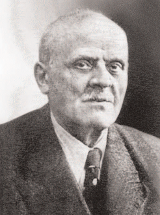U.Porto Memory
University of Porto Famous Alumni
Francisco Xavier Esteves
 |
Francisco Xavier Esteves 1864-1944 Engineer, teacher, politician and industrialist |
Francisco Xavier Esteves, son of Alberto de Faria Esteves and Elisa Correia, was born in Ílhavo on 8 October 1864.
When he was young, he studied Engineering at the Polytechnic Academy of Portoin the 80’s of the XIXth century. He obtained the degree of Engineer in Public Works on june 22, 1886, and later of Mining Engineer on august 30, 1911 (although he completed his training in 1885).
As a student, he directed the Álbum literário comemorativo do terceiro centenário de Luís de Camões [literary album for the 300th birthday celebration of Luis de Camões] (1880), with contributions from great national and foreign writers.
After graduating, he presented a dissertation for concurse to the Polytechnic Academy of Porto - Theoria dos cursos liquidos em regime permanente : Dissertação de concurso á Academia Polytechnica (Porto, 1890), but came to teach at the Industrial and Trade Institute of Porto and at the Technical Faculty of the University of Porto. He took up management functions at the Sociedade de Electricidade do Norte de Portugal [electrical company] and Companhia de Cimento Tejo [cement company] (set up in 1894, with its factory in Alhandra and headquarters in Porto, the company introduced Portland cement in our country). He also chaired the General Meeting of Mutual do Norte.
During the 20’s, he established the company “Xavier Esteves e C.ª”, an importer of machinery for agriculture and industry, and rolling stock for the railways, and exporter of industrial products.
 Xavier Esteves supervised famous construction works in the north of the country. He was in charge of the construction of Livraria Lello & Irmão (former Chardron bookstore), a neo-Gothic building in Carmelitas Street, in Porto, recently considered the third most beautiful bookstore in the world by the English newspaper The Guardian. He was also in charge of the construction of the house of Augusto Nobre (1898), in the Castelo do Queijo street (Montevideu avenue) n.º414, the Cine Foz, in the Esplanada do Castelo, and the first facilities of Empresa Fabril do Norte, in Senhora da Hora.
Xavier Esteves supervised famous construction works in the north of the country. He was in charge of the construction of Livraria Lello & Irmão (former Chardron bookstore), a neo-Gothic building in Carmelitas Street, in Porto, recently considered the third most beautiful bookstore in the world by the English newspaper The Guardian. He was also in charge of the construction of the house of Augusto Nobre (1898), in the Castelo do Queijo street (Montevideu avenue) n.º414, the Cine Foz, in the Esplanada do Castelo, and the first facilities of Empresa Fabril do Norte, in Senhora da Hora.
In the Porto Industrial Association (now Portuguese Business Association) he served as Secretary from 1903 to 1910 and twice as its Chairman (1914 to 1919 and 1919 to 1937). He represented the association in the National Colonial Congress of 1924 and wrote texts on union principles.
At the same time as he worked as an engineer, industrialist and union leader, he became involved in politics. Early in life he embraced the Republican cause, and in 1895 he joined the Porto Republican Party as a Directory member (1899-1902).
In 1900 he became an elected member of the Republicans, with Afonso Costa and Paulo Falcão, following the symbolic vote of Porto against the central power, after the quarantine imposed on the city during the outburst of bubonic plague in 1899.
He was elected town councillor of the Republicans between 1907 and 1910, and served as Mayor of Porto between 1911 and 1913. He was again elected as councillor of Porto in 1911 and 1918.
His activist past is also marked by his arrest in 1916, when he was accused of having participated in the conspiracy led by Machado dos Santos.
 In 1917 and 1918, Francisco Xavier Esteves interrupted his functions as Chairman of AIP to be part of the government led by Sidónio Pais as Minister of Commerce (between 11 December 1917 and 7 March 1918) and Minister of Finance (between 7 March and 15 May, and between 15 May and 1 June 1918). As the Minister of Commerce, Esteves managed to convince the government to return the Palácio da Bolsa to the Porto Trade Association, which had been taken over and vacated in 1910, and chaired the Directory of the Republican Party.
In 1917 and 1918, Francisco Xavier Esteves interrupted his functions as Chairman of AIP to be part of the government led by Sidónio Pais as Minister of Commerce (between 11 December 1917 and 7 March 1918) and Minister of Finance (between 7 March and 15 May, and between 15 May and 1 June 1918). As the Minister of Commerce, Esteves managed to convince the government to return the Palácio da Bolsa to the Porto Trade Association, which had been taken over and vacated in 1910, and chaired the Directory of the Republican Party.
In 1918 he resigned from the government and, from then on, because of the regime’s course of action, he began to take part in the employers’ movement against the Republican institutions and governments.
In 1925 he joined the Party for the Union of Economic Interests. In 1926 he accepted the dictatorship arising after the 28 May coup, although later he would disagree on the institutionalization of corporatism. In 1927 he was appointed Chairman of the Central Board of the Union of Economic Interests, an organization that represented trade and industry associations.
He died in Porto on 2 September 1944.
(Universidade Digital / Gestão de Informação, 2010)
Last updated: 2018-02-12 Webpage created on: 2024-05-11 09:13:26 Complaint Portal